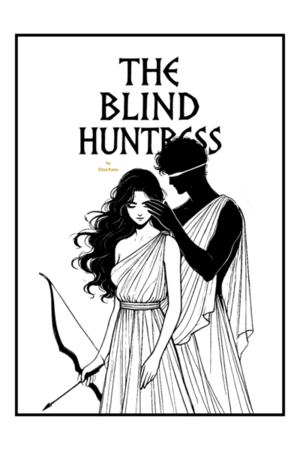Chapter 1:
CHAPTER 1: Mēlesía, Daughter of Agrévōn
The Blind Huntress (short light novel)
CHAPTER 1
ΜΗΛΕΣΙΑ ΑΓΡΕΥΟΝΤΟΣ
Mēlesía, Daughter of Agrévōn
Late Autumn, 412 B.C.E.
The scent of pine resin and damp earth curled through the crisp late afternoon air as Mēlesía, daughter of Agrévōn, moved carefully between the old olive trees, bow in hand.
The thin chiton she wore, once dyed yellow from onion skins and tannins, had faded to a pale beige after too many washings.
Her feet were silent upon the earth, calloused from years of hunting within the wilds.
Today, Mēlesía had been hunting since dawn.
Her body ached, but she pressed on.
Late autumn had been harsher than expected.
Lately, grain dwindled too quickly. The amphorae of oil and barley in her village were often bare. Children cried from hunger, their mothers rationing the last handfuls of wheat for their families and friends.
Mēlesía’s mother had been claimed by the wasting fever years ago—and her father, once a well-known hunter of boar and stag, was now too weak to draw a bow.
With no siblings to share the burden of the household, the duty fell to Mēlesía alone.
She took up the task with courage, oftentimes enjoying the freedom that the hunt for food allowed her more than she knew she should.
Mēlesía and her father lived in a small, wind-worn village named Perisykē, nestled within the rugged hills of Epirus, famous for its oak.
This year, Mēlesía had followed the tracks of mammals farther than ever before.
She traveled through unfamiliar hills, past the now-frosted, late-autumn groves of cypress—where the elders of her village had warned her never to go past, because something else entirely awaited beyond them.
She had not meant to stray so close to sacred land...
Today, driven by hunger, she believed she had little choice.
⁂
Then it happened, hours later.
The stag emerged at dusk—a great creature, dark-coated and lean, standing at the edge of the olive-wood forest, peacefully grazing beneath a healthy fig tree.
Mēlesía’s fingers tightened around her bowstring.
The gods must have sent it—a sign, a gift for the hungry.
She steadied her breath, knuckles pale against the polished wood of her bow.
The gods did not give freely—but this was an offering to her, it had to be.
Her dark curls clung to the sweat on her brow. Her eyes, the deep gold of late-autumn honey, did not waver from the stag.
She drew back the arrow. She let it fly.
The shaft struck true.
The stag lurched—but did not fall.
Instead, through instinct, it bolted into the thicket, wounded but still running.
Mēlesía’s heart pounded.
She could not let it escape.
She ran after it with trained speed.
The wind snatched at her chiton, whipping it through bare branches.
The villagers feared a ring of fig trees nearby—a mysterious growth of nature—a near-perfect circle of fig trees enclosing a secluded portion of the greater forest, making the ring into an unexplored woodland within.
The ring of fig trees stood tall, their trunks and twisted roots woven together like thick braids—so tightly that their crowded trunks and branches formed a dense wall.
The fig trees bore plentiful fruit ... however, only wild creatures dared to eat them. To step into the ring of fig trees was to enter a realm not meant for mortals. A place unknown and unseen. Over time, this mysterious, naturally formed ring of fig trees became synonymous with Nýxios, god of the unseen, who was believed to dwell within the forest the fig tree ring encircles.
Mēlesía heard her father’s voice rise from memory once more: “Nýxios does not welcome trespassers—least of all hunters.”
Nýxios … she would do whatever she could to keep away from his territory.
He was no Olympian, no god who ruled from a golden throne.
Some called him Tetranýx, believing he was not a single entity but shadows layered upon themselves, folding endlessly into the unseen. Yet, the elders never spoke of Nýxios as cruel, nor as evil. Diplomatic, they said, or simply absent.
He was not feared for what he had done. He was feared for what he was—the unseen and the unknown.
To this day, even the god Nýxios himself remained unseen by mortal eyes.
Myths and warnings of the Fig Tree Ring were both popular and sacred in Mēlesía’s village, often whispered over flames, passed down from elders to kin, or shared with any wanderer who cared to listen.
A vicious hunger tore at Mēlesía’s stomach.
That’s when she saw it; again, hope.
A glimmer of fresh blood, splattered across a flat slab of dark stone.
The stag was near, wounded.
She hunted on, hoping to end its suffering.
The mountains were not kind to the desperate.
The sun dipped lower, painting the slopes in blue and violet hues. The world had begun its descent into twilight, the last rays of Helios slipping behind the peaks of the trees around her.
It was getting late.
She had to return home soon.
All at once, she saw it: The wounded stag stepped into view. It stood trembling just beyond a tightly woven cluster of fig trees.
Mēlesía exhaled slowly, syncing her breath with the breeze as she maneuvered past the thick fig trees. She set an arrow to the bowstring, steadied her grip, and drew back in one fluid motion. As she did this, tension thrummed through her fingertips, coiling within her palms.
The gods had given her this moment, surely—now, she need only grasp it.
She released.
The arrow flew, and it struck true.
The stag collapsed.
Mēlesía let out a shaky breath.
Thank the gods.
Without hesitation, she darted forward, boots striking damp earth as she closed the distance to the fallen stag.
As she neared, she noted how light it was—winter-starved, its ribs sharp beneath its thinning hide. Too small to feed the whole village, but enough for her family and a few friends. Good. Good enough.
She’d have to drag it first, then hoist it onto her back when the terrain allowed.
If she had a horse or mule, she would have slung it over the saddle, tied securely.
Now, she would bear the weight herself.
The journey home would be slow, but she had done it many times before.
Then, she hesitated.
Something felt wrong.
She glanced behind her, realizing that she had stepped inside the circle of fig trees through an opening in their branches.
Her stomach twisted. Too late.
The weight of her trespass sank deep within her, heavy as stone. She had spilled blood where the gods watched, where no mortal hand should have drawn a bow. Desperation had dulled her wisdom, blinded her to her parents’ warnings.
Still, to her shame, relief stirred within her.
She had food. At last. Enough to keep her father from fading further.
She crouched low, moving faster now—then, a sound.
Not one that belonged to the forest.
A wrong crunch of leaves.
A human footstep.
Her eyes scanned the trees, the earth, the shifting shadows—nothing. Nothing out of place.
Yet, the air felt different.
She had been raised to respect sacred groves—the elders warned against hunting too close to land claimed by the gods—taking a life here, without offering proper tribute, could bring misfortune…
She had to retreat. Quickly.




Please sign in to leave a comment.